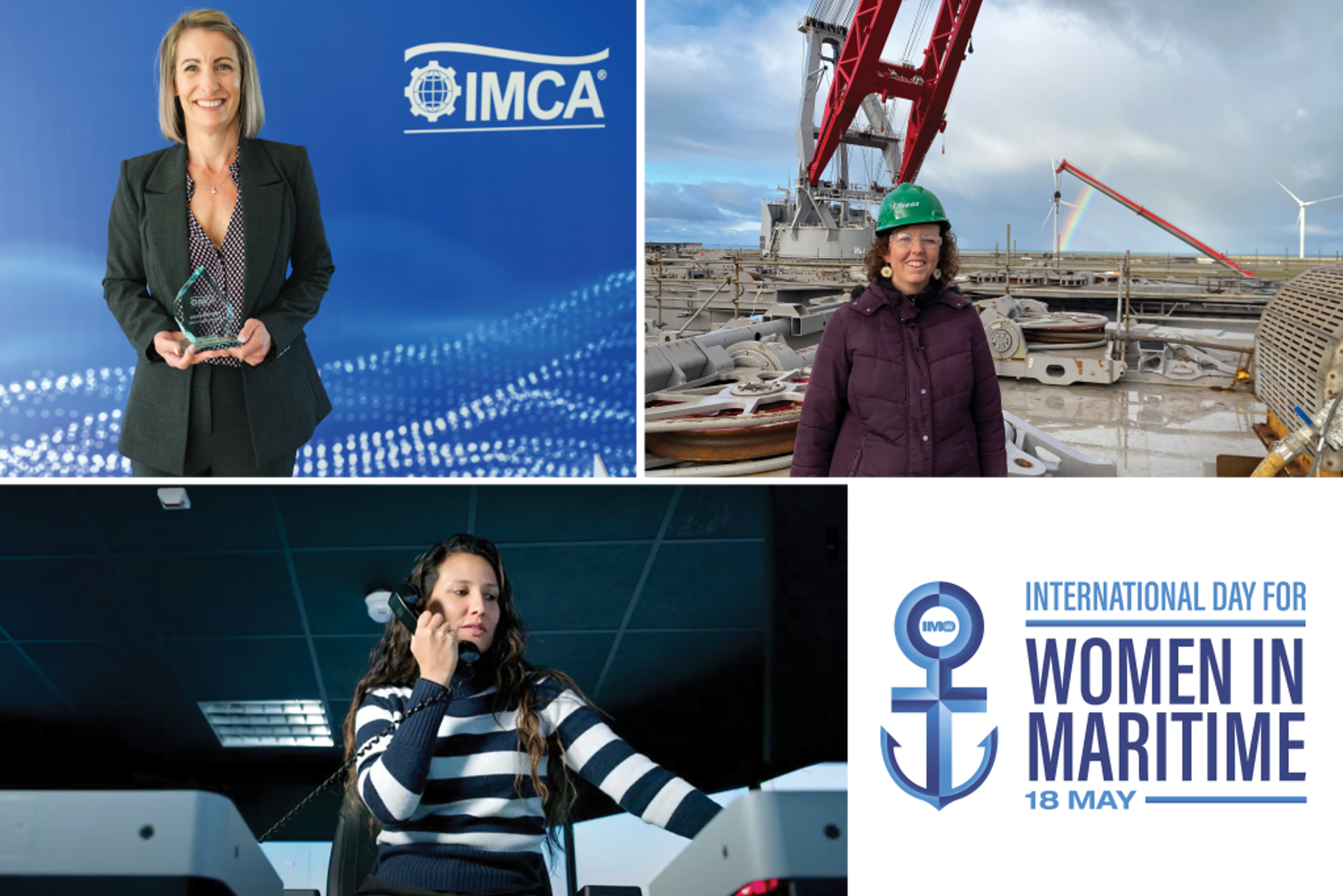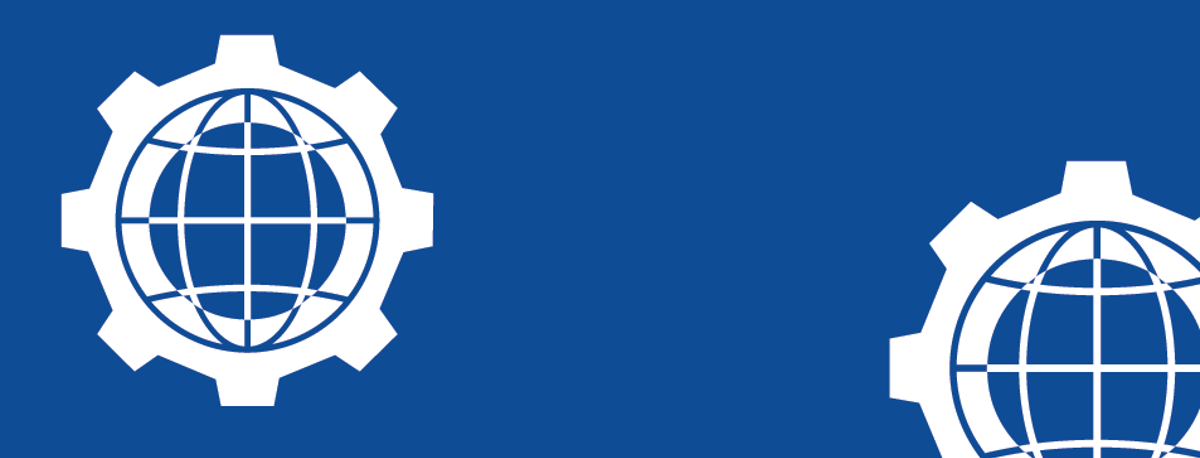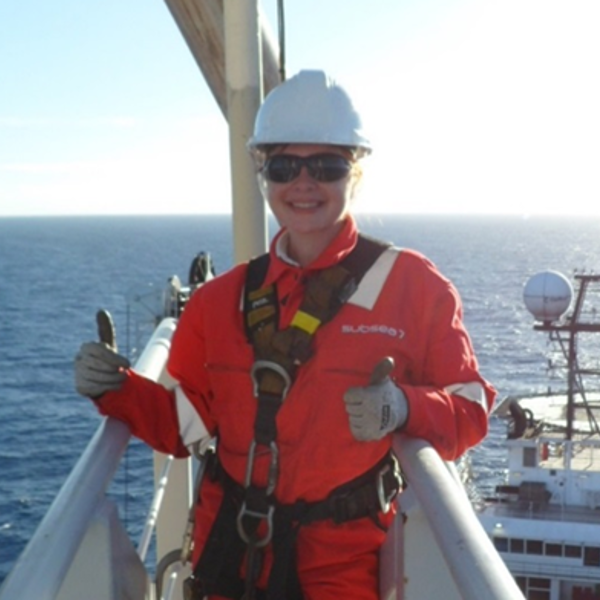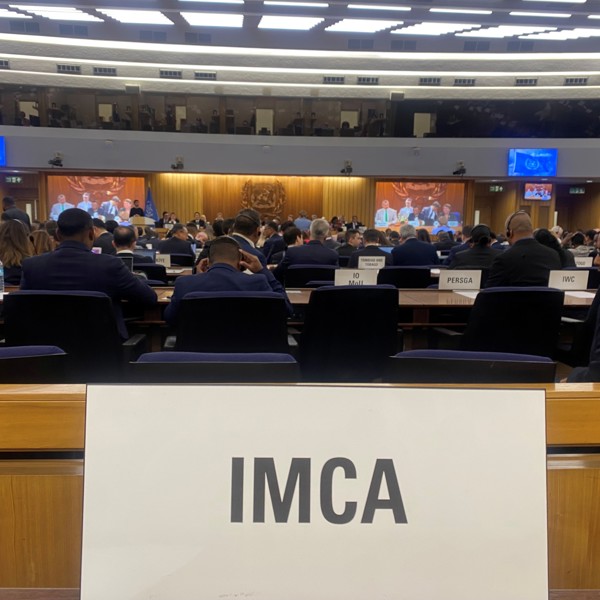Every year on 18 May, the IMO marks the International Day for Women in Maritime. This year’s theme is 'Safe Horizons: Women Shaping the Future of Maritime Safety.'
As well as celebrating the contribution of women to the maritime industry, there are real safety concerns for women working at sea such as inadequate protective gear, greater risk of injury due to the physically demanding nature of maritime jobs, sexual harassment and assault, and critically, isolation and mental health.
The IMO’s Symposium, Safe Horizons: Women Shaping the Future of Maritime Safety will address these concerns by discussing ways we can promote the recruitment, retention and sustained employment of women in the maritime sector. The goal is to make the offshore industry a safer place where women can not only work, but also thrive.
In recognition of this significant day, we’ve asked three women working for IMCA Member companies to talk about their careers, their experiences and how we can encourage more women to join our industry.
We spoke to Kate Harvey, General Manager of G+ and IMCA Board member, Debbi Garreffa Executive General Manager – Risk at MMA Offshore, and Vice Chair of our HSS Committee and Cinthya Lopes, Technical Manager-Head of Simulation of Member company Simwave and Chair of the Europe & Africa region, about their experiences as women in the offshore industry.
Thank you for taking the time to talk to us about your career path and experiences over the years. Can you describe how you came to work in the energy/offshore industry?
Kate Harvey: “I started as a graduate accountant at a global electricity generation company and worked in a variety of energy generation areas before deciding that offshore wind was the one for me."
"Twenty years on and offshore wind still fascinates me. I have been the CEO of the G+ the Global Offshore Wind Health and Safety Organisation since 2016, and a Board Director of IMCA since 2022.”
Debbi Garreffa: “My decision to join the maritime industry was not planned and I did not foresee spending the length of time in the industry that I have. I have been constantly surprised by the changing nature of the industry and as a result, the opportunities that have been afforded to me. I have worked across a multitude of functions during my time in the industry including HSE, Commercial, Contract Management, Operations and Logistics. Most recently I have taken the role as Executive General Manager – Risk, overseeing the global HSE, Compliance and Risk portfolio for MMA Offshore."
"I am also a member of the IMCA Asia Pacific Regional Committee and Vice Chair of the IMCA HSS Committee. I am a true believer in making the most of any opportunity presented, think ‘yes’ before you say ‘no’ and believe in your own abilities. Ask questions and never stop learning.”
Cinthya Lopes: “I joined the Merchant Marine Academy in Rio de Janeiro, Brazil, when I was 17. After four years of shore study and onboard cadetship, I graduated as Navigation Officer before sailing the world on bulk carriers. I later decided to work as a Dynamic Positioning (DP) Operator in the oil fields in Brazil, which kickstarted my onshore career in the maritime simulation field. First as DP Instructor for the Brazilian Navy and private companies. Seven years ago I moved to The Netherlands with my family to work as Head of Simulations and Project Manager for Simwave’s Offshore department.”

And what were the biggest challenges you have had to overcome in your career that – perhaps – a man might not experience?
Cinthya: “The biggest was, definitely, to get the gentlemen onboard to trust that I could be as good as them. I was 21 when I joined my first vessel as Navigation Officer and as an Officer, I was always the only woman onboard. For most of them, it was the first time working with a woman, especially a very young one, so there was some hesitation in accepting that I could do a good job."
“The other challenge was loneliness. It affects all seafarers, of course, but being the only woman in an iron island, sailing weeks or months on end, with limited contact with family and friends (there was no internet onboard on those days) was tough.”
Kate: “In the early 2000s I was frequently the only woman in the room, which worked to my advantage, as I was remembered as the young woman not afraid to voice their thoughts. As equality became more of a movement, I have become more aware of it. I am a big believer in speaking up if a situation does not feel even. As a mother with two daughters and with a team of strong capable females, I feel it is my duty to do this for those that follow. It is key for young women to see role models that they can aspire to be like; to show it is a realistic ambition.”
Debbi: “Though I appreciate women can experience career challenges because of their gender, I have few examples this. My own challenges have predominantly been the result of a lack of confidence in my own abilities and often manifest in the form of imposter syndrome, which is by its nature something that women tend to experience more than men. Men are typically less humble, overconfident, and less concerned about failure. Even today, after many years in the industry, my biggest challenge remains that of having confidence in myself, in my abilities and in the belief that others have in me that I often don’t recognise.”

Being the only woman in an iron island, sailing weeks or months on end, with limited contact with family and friends was tough...
How would you encourage more women to join and work in our industry?
Kate: “Engineers are needed for many roles and this study route has historically been male dominated. We need to show women that it is an interesting university course and all the jobs that are available at the end of it. However, we also need to show that you do not need an engineering degree to work in the maritime industry. We need all the skill sets, and if women are already working in the industry, they will be exposed to all the exciting roles that are available.”
Cinthya: “By showing the beauty of the work itself. The maritime industry is not only beautiful but necessary. Being able to work on a ship, oil rig or other sea asset is special since the tasks we do are so challenging and different. I was always rewarded by the sense of feeling useful to the world economy, because that’s what we do when we sail a vessel that brings cargo through continents. That inspired me to go on.”
Debbi: “There is no single answer to this, however, I truly believe that an increase in the prominence of the industry as a choice for young women as a career path would be an ideal start. This should include promoting the industry at education level, communicating the broad array of careers that exist within the marine industry and creating a program, designed to attract people into the fields of Science, Technology, Engineering and Mathematics (STEM)."
“The maritime industry has typically been male dominated; however it is one where roles can be successfully undertaken by women as they can men. Unfortunately, often women do not know about these roles and don’t see the careers paths available. The encouragement of women into the maritime industry requires a globalised approach. We need to recognise and capitalise on the differences between men and women which will create a more diversified workplace.”

Only 1.2% of the global seafarer workforce are women and that is an increase of 46% from 2015, those statistics make it clear that we need to take drastic action.
What would you like to change to make women’s paths to offshore positions easier?
Debbi: “The more important consideration in this space is making the offshore industry attractive to women. Presently the understanding of the types of roles within the offshore maritime industry is limited and seen to be a discipline predominantly for men.”
Kate: “There is no getting away from the fact that there are many jobs in the maritime industry that need you to work away from home for prolonged periods. That is probably fine for those starting out in their career, but not all women will want to do that when they are further into their working life. We need to ensure that this does not put off women from entering or result in them leaving and that there are other options for those that do not want to stay working offshore."
"Only 1.2% of the global seafarer workforce are women and that is an increase of 46% from 2015, those statistics make it clear that we need to take drastic action.”
Cinthya: “Improve safety measures to address any concerns women may have about working offshore. This includes implementing policies to prevent harassment and discrimination. The lack of trust that I had in the beginning is much less now, but it is still there, which can create a discriminative environment.
“Also to promote women as capable as men and to create regulations/laws that empower women to start a family without the fear of putting their positions at risk. I understand that women have to be more absent than men when a child is born, but that is human nature.”
Many thanks to Kate, Debbi, and Cinthya for sharing their insights with us.
Days like the IMO’s International Day for Women in Maritime offer a great opportunity to recognise and celebrate the contribution women make to our industry. They are also an opportune reminder of how much more work remains to be done.



